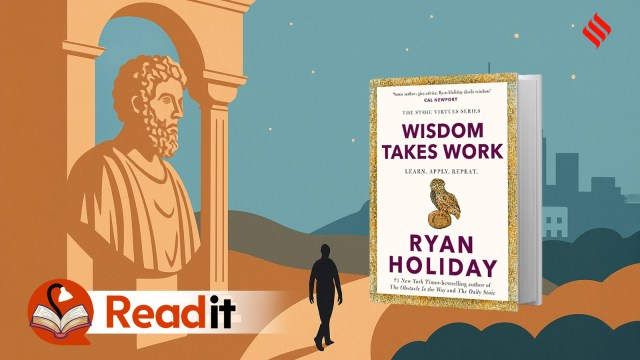Discipline takes work — Ryan Holiday makes a case for why it’s worth it
Stoicism has enjoyed a revival of sorts in recent times, with a number of authors and thinkers highlighting its relevance in modern life. And one of those who have played a key role in making stoicism mainstream is Ryan Holiday.
 Holiday's books are not the typical self-help books that aggressively try to push you in a direction, but rather nudge the reader in the general direction of thinking and self-improvement.
Holiday's books are not the typical self-help books that aggressively try to push you in a direction, but rather nudge the reader in the general direction of thinking and self-improvement. Ryan Holiday is credited by many for reviving interest in stoicism, the ancient Greek and Roman philosophy that revolves around virtue and reason and most importantly, learning to live with what one cannot control. The philosophy was an integral part of ancient Rome, and reached its peak under Emperor Marcus Aurelius, who alas is remembered by many today as the father of Commodus in Ridley Scott’s Gladiator, but had generally faded out.
Reviving stoicism, with books on Stoic Virtues
Stoicism has enjoyed a revival of sorts in recent times, with a number of authors and thinkers highlighting its relevance in modern life. And one of those who have played a key role in making stoicism mainstream is Ryan Holiday. While others have tended to either be too academic about stoicism or have tried to present it as a sort of self-help-through-ancient-wisdom formula, Holiday has taken a middle path, blending ancient wisdom with modern anecdotes to deliver books that are, thanks to his narrative skills, easy to read and interesting enough even for those not interested in stoicism. It is a formula that has made him a bestselling and widely followed author.
Holiday’s books are not the typical self-help books that aggressively try to push you in a direction (think The Secret by Rhonda Byrne), but rather nudge the reader in the general direction of thinking and self-improvement. Wisdom Takes Work completes what Holiday refers to as the Stoic Virtues Series, which also comprises Courage is Calling, Discipline is Destiny and Right Thing, Right Now. Holiday says that courage, temperance, justice and wisdom, together comprised virtue in the ancient world (“the touchstones of goodness,” as per Marcus Aurelius) and after tackling courage, temperance and justice, he turns to wisdom in his latest bestseller (it shot into the NYT bestseller list on release).
Putting in the work for wisdom
Wisdom, according to Holiday, is a constant process of learning and is the most elusive virtue of all – “it is something to which you aspire, something that we are always trying to acquire.” In Holiday’s book, wisdom is not just about knowledge but about action and then learning from that action itself. It is also a path one has to choose to follow. “Just as no one is born wise, no one is born dumb – ignorant, sure, but remaining so is a choice,” he writes at the very beginning.
Wisdom Takes Work is about what one needs to do to acquire wisdom. It spans about 400 pages, but is not an intimidating read because it is divided into more than fifty short chapters, generally spanning 5-7 pages. At first glance, a lot of what Holiday recommends seems to be generic self help gobbledygook (Learn to Listen, Be Curious, Study the Past. Think for Yourself, Make Mistakes, Always Stay a Student, Don’t Lose the Wonder, and yes, Be Happy, etc), but as one delves into the book, one discovers that there is a fair bit of substance beneath that seemingly predictable surface.
Standard Holiday – lots of famous names and trivia
The book follows the classic Ryan Holiday formula of opening a chapter or section with an anecdote, and then connecting it either to ancient wisdom or modern life. We are told about how Marcus Aurelius on receiving two letters, one of praise and one of criticism, from his mentor Fronto, actually thanked him for the criticism. “I swear to you the first letter gave me the greater pleasure and that as I read it I exclaimed several times, “How lucky I am.””
As always, Holiday laces his narrative liberally with anecdotes. Hardly a page passes without a reference to a famous person or event. One reads about how the Wright Brothers’ insatiable curiosity helped them become aviation pioneers, how Richard Feynman’s father encouraged him to ask questions, how Lyndon Johnson always sought out mentors, how Elon Musk learnt about rockets by reading profusely from “a self assembled reading list” that included “obscure Soviet rocket manuals,” or how Churchill was never afraid of making mistakes (and made many!). Cynics might label it name-dropping, but it makes the book more believable and interesting, as compared to theoretical monologues on the subject.
There is also truckloads of trivia to be found in the pages of Wisdom Takes Work, and we often found ourselves shaking our heads in surprise when coming across facts like Malcom X secretly meeting members of the Ku Klux Klan or that “cardinal virtues” are not termed so because they are connected to Cardinals, but because they are pivotal to life – “cardo” in Latin means “hinge.”
Lincoln and Musk – Dr Jekyll and Mister Hyde
All of which make Wisdom Takes Work, like its predecessors, a very interesting read indeed. It is not perfect, as Holiday’s personal preferences at times colour the narrative. This is most obvious in two of the longest chapters in the book. In The Storm Within Us, Holiday takes a less than flattering look at Elon Musk, warning us that “the most dangerous thing that can happen to the smartest people in the world is to start believing that they are the smartest person in the world. It turns them into a very dangerous fool,” comparing him to King Midas.
In Shrewd, Sensible, Sound, Strong, Holiday goes to the other end of the spectrum, unabashedly praising Abraham Lincoln. “Licoln was, it is not an exaggeration to say, the complete man. Disciplined. Courageous. Just. Most of all, wise,” he writes in almost fanboyish mode. Some might also take issue with Holiday’s criticism of Socrates, who Holiday says “could have kept going” for a longer time “with a little more savvy and a little more restraint.” But although such passages might annoy some readers, the constant array of anecdotes ensures most keep reading.
A great read, even for those who do not seek wisdom
Wisdom Takes Work is not a spiritual textbook, a practical workbook or even an in-depth study of a concept, but like other books in the Stoic Virtues Series, it is more a discussion around a concept, and a great starting point for those who want to know about stoic concepts. There is no clear conclusion and some of the process of acquiring wisdom seems a little generic and can be applied to just about anything (Understand People and Learn to Listen are hardly stunning revelations), but there is lot of learning and information here, almost always presented in a manner that is neither intimidating nor preachy. On the subject of presentation, the layout of the book, like others in the series, is very classy – the book is square-ish in shape, and pages are laid out elegantly with generous margins. It is also surprisingly priced at just Rs 699 – hard cover editions generally get closer to four figures.
All of which make Wisdom Takes Work well worth reading. Even if all you are seeking is an interesting read, and not wisdom. There is so much information (ancient, medieval and modern) here that chances are you will end up wiser after reading it. We know we did.



- 01
- 02
- 03
- 04
- 05




























